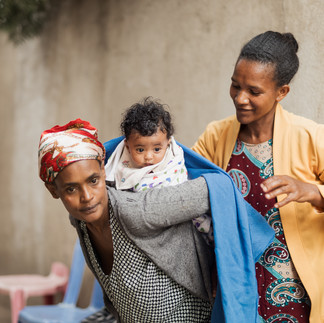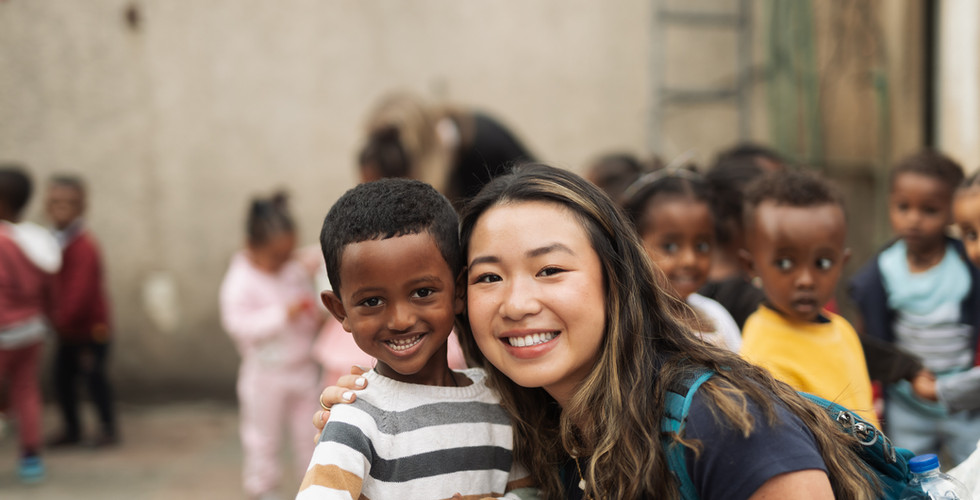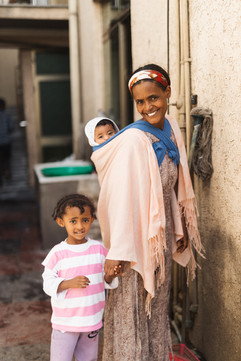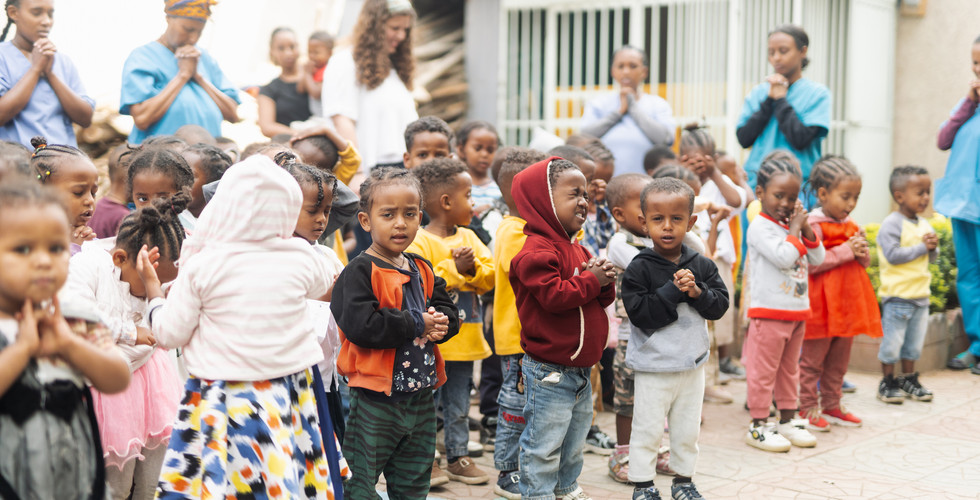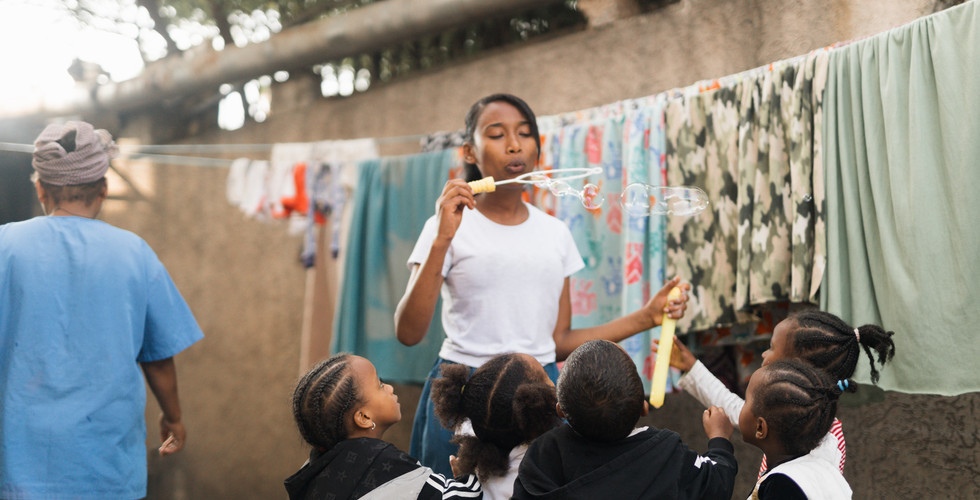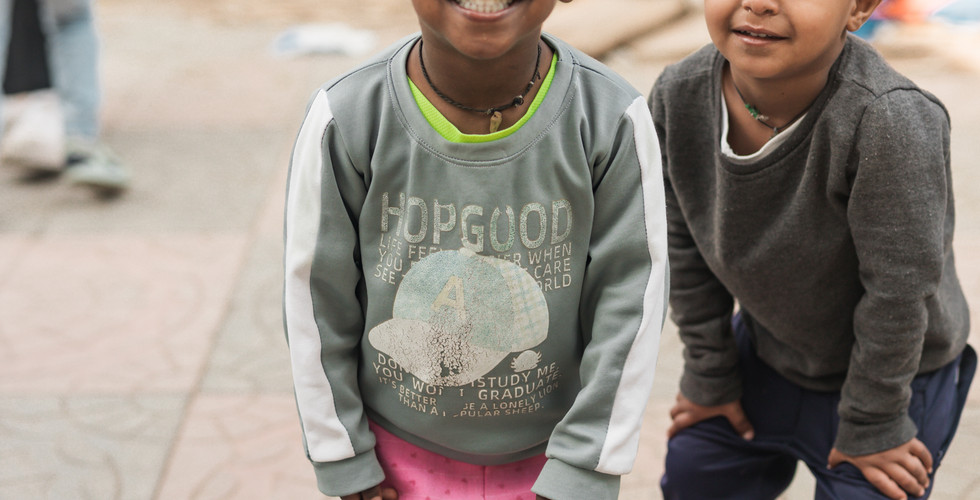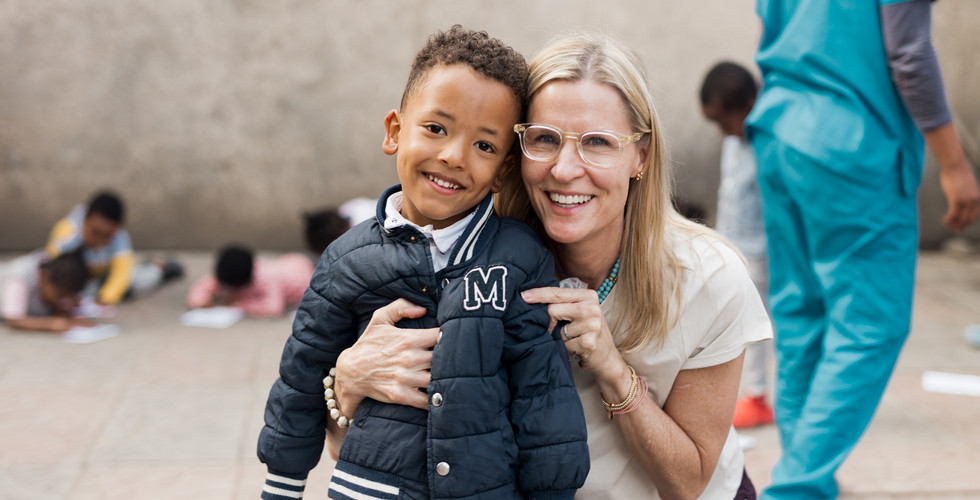Adera Foundation | Addis Ababa, Ethiopia | March 2025
- Katie Hoang
- Mar 31, 2025
- 16 min read

Life-changing. Selfless. Generous. Persevering.
These are words to describe the work that the Adera Foundation does in Addis Ababa, Ethiopia.
God intertwined my life with Adera's story when he gave me a nudge of courage to stay in Professor Julie Miller's Global Business class at TCU Neeley School of Business. I left her class with a deep heaviness after hearing the stories of women and children who have experienced hurt, betrayal, and the worst the world can show a person. With an encouraging smile and tight hug after class, Julie reassured me that it was only going to get better. Since then, my journey with Adera has led me from a classroom in Fort Worth to halfway across the world in Addis Ababa, Ethiopia.
The staff of the Adera Foundation change the lives of hundreds of men, women, and children every single day. Being witness to their impact has forever changed my life.
Here is my recap of Spring Break with Adera:
Day 1 | Saturday, March 8 | Arrival
I landed in Addis Ababa from Rome around 1:30 p.m. and immediately spotted Julie in her bright salmon pants, a beacon of familiarity. At passport control, I shyly practiced my amesegenallo (“thank you” in Amharic) and was rewarded with a few cheerful gobez! (“good job”). After making it through customs, I reunited with the rest of our team—14 of us in total—and somehow we gathered over 30 checked bags in record time.
The sun greeted us with warmth, a welcome contrast to chilly Rome. One kind man helped wrangle my runaway suitcase, smiling wide. Emma and Eliza heroically pushed a towering luggage cart uphill with help from local hands.
Solomon, our ever-reliable driver, pulled up with the big van, and we were met by Elias—the Adera country director—and several other staff members. We headed straight to the Adera office, where the hospitality began immediately with a traditional Ethiopian coffee ceremony. The coffee was strong and rich—just like the stories of resilience and faith we’d soon encounter.
That evening, we checked into the hotel, ate dinner, prepped for the week ahead, and rested.
Day 2 | Sunday, March 9 | Worship and Field Day at Hiber
"Be a servant of God and of the Lord Jesus Christ." – James 1:1
Our morning began with a group devotional through the beginning of the book of James. As we opened God’s Word, I felt an anchoring peace, reminded of why we were here—to serve, to listen, and to love as Jesus does.
After breakfast (and trying more traditional foods!), we made our way to International Evangelical Church. The campus was buzzing with life—children giggling, families greeting one another, worship music echoing from every room. Little girls ran across the courtyard grass, quickly spotting the group of Americans walking through. We joined in their hide-and-seek games and watched their cartwheels and backbends—simple moments of play and joy that transcended our language barriers.
Inside the sanctuary, worship was vibrant and heartfelt. The room was filled with Ethiopians, Americans, and believers from all over the world—united in praise to the same God. The sermon spoke boldly about conflict in relationships and the brokenness many families experience in Addis Ababa, including the pain of domestic violence and divorce. It was sobering but necessary truth, one that mirrored many of the stories we would hear from Adera moms later that week.
After church, we grabbed lunch at a burger place—so delicious! Then we jumped right into field day prep. Solomon drove us to Hiber, a large dirt field where we had set up games for the Adera children. Maddie and I were red team leaders, while others helped run stations or led their own groups.

Our first game involved using pool noodles like hockey sticks—it was chaotic and fun. The kids were shy and sassy at first, but soon dove into the competition. I started learning names and made fast friends with a group of 13-year-old girls—Cefin, Yabsira, and her little brother Samy.
We played balloon stomp and partner kickball, and somehow the red team stayed undefeated! But more important than any “win” was the unity, joy, and team spirit that grew throughout the day. The Adera staff were incredibly patient and graceful as translators—quiet heroes of the day.
After the games, we helped serve lunch. We formed an assembly line to dish out injera as the children rotated through. Some ate quickly and left to make space for others, while a few lingered—curious about the ferenji (foreigners), asking with wide eyes, “Where are you from?”


As we wrapped up, a translator named Sarong pulled me aside. A group of older students wanted to meet me. I was introduced to Messi, Meskeret, and Sarai—juniors and seniors in high school. They asked if I was from China (a question I would hear often that week), and then opened up about their dreams: to become a journalist, a lawyer, a doctor. The girls shared their struggles—how difficult it is to be a woman in Ethiopia, facing both pay gaps and discrimination.
Their stories stayed with me as we drove away that evening. My heart was full, yet burdened. The weight of injustice mixed with a quiet hope—because even here, in a place where hardship is written into daily life, the light of Jesus is bright. Through Adera. Through His people. Through love.
Day 3 | Monday, March 10
“Consider it pure joy, my brothers and sisters, whenever you face trials of many kinds…” — James 1:2
Monday felt like our first big day.
We had a full schedule ahead—visiting the Adera Daycare and Charisma Kindergarten in the morning, helping with the Hiber Feeding Program, Ava’s reunion with her birth mom, meeting the Adera moms at the Bead House, and conducting intake interviews.
The girls who had been to Ethiopia before always said the Adera Daycare was their favorite part. So with eager hearts, we loaded Solomon’s van after morning devotionals and breakfast, ready to meet the joyful 4- and 5-year-olds who filled that place with light.
The Daycare was exactly what I imagined: a courtyard filled with bright eyes, contagious giggles, and tiny hands reaching for bubbles in the air. Music played in the background as the children danced and laughed. I’ve always loved kids—the way they naturally love you, ask questions about everything, and find joy in the smallest things.
I made the rookie mistake of walking in with my camera, and before long it was covered in sweet little fingerprints. But that camera became a bridge—it introduced me to so many little ones: Zemariyam, Annaniyan, Natimah, and Bastega. We played, danced, and hugged until it was time for the children to line up. Together they recited the months of the year, sang the Ethiopian national anthem, and said their prayers. We said our goodbyes—already counting down the moments until we’d see them again.

Next, we visited Charisma Kindergarten, where some of the Adera children are enrolled. We rotated through classrooms, reading The Runaway Bunny, doing crafts, and leading games. Each child received a bar of soap and towel as part of the activity. One of their favorite games was a memory challenge involving a Peep marshmallow—they were involved once they realized the fluffy bunny was actually edible.
The Runaway Bunny tells a story of unconditional love—of a mother’s steady pursuit and unshakable devotion to her child, no matter how far they run. It’s the kind of love that reflects God’s heart for us. That message hit me in a new way, sitting cross-legged in a kindergarten classroom halfway across the world. What surprised me most was the students’ quiet attentiveness. I don’t remember being that focused at five years old. From classroom to classroom, they listened carefully and responded with excitement to each new lesson.
After teaching, we headed to Hiber Public School for the feeding program. We arrived during a passing period, and in an instant, were surrounded by a wave of students. Hiber is the local public school that has thousands of students enrolled. Hands tugged at our straight hair while hugs and laughter enveloped around us. Their energy was magnetic.
At Hiber, Adera feeds over 550 students—many of whom are at risk of malnourishment due to poverty. I was in awe of the women working in a small, dimly lit kitchen to prepare food for hundreds of children. They move with strength and serenity, their every action a picture of Jesus feeding the hungry with compassion and grace.

After the meal, we went into a Hiber classroom to help with reading. We read Chrysanthemum—a story about embracing individuality and choosing kindness even when faced with teasing. The kids lit up during a flower-themed spelling game where the Adera visitors had to learn how to spell out amesegenallo. It was beautiful to watch how stories and play can teach such important truths.

While we were at Hiber, one of our team members, Ava—a high school student—had the opportunity to meet her Ethiopian birth mom after 16 years. We had all been praying for her. When she and her mother arrived at the Adera office later that day, there wasn’t a dry eye in the room when we walked in. That kind of reunion only God could orchestrate. His hand of protection over Ava and her brother, and His perfect timing in bringing restoration—it was all a testimony to His goodness.
After lunch at the Adera office, we visited the Bead House, where several Adera mothers work making the beautiful jewelry that supports their families. That day was also “interview day,” where Adera staff intake personal updates to understand how to best support each mom.

We used questions from design thinking, something I had learned in Professor Julie’s class. We began gently—asking about their families and daily life. But soon we asked deeper questions: What is your dream? What does God mean to you? Many of the women’s faces lit up at that last one. Even the Muslim women allowed us to pray over them. That moment—hands held, prayers spoken softly, love shared without condition—was what Adera's mission is.
(Photos by Ronnie Mosley)
While some of our group continued the interviews, I spent time getting to know the moms waiting outside. One face stood out immediately: Tazita. I remembered her from class. Her smile was unforgettable. A few months ago, a visiting dentist helped her restore her teeth—and her confidence. Now, she was proud to tell me about her new hairstyling job. We sat together and talked as others gathered nearby—some moms quiet and shy, others chatting with babies strapped to their backs.
They were stunning. Strong. Steady. Sisters in a community built not only on shared struggles but also on hope. What struck me most was how radiant they were. Women the world might overlook—but God sees them.
While interviews were still being conducted, I sat down with the Girl's Club which is a group of students Adera brings together to have a safe place to share and talk. We talked about school, boys, and dreams. I shared my story and found that we shared many similarities.

We ended our night with at festive Mexican restaurant and rested for the next day.
Day 4 | Tuesday, March 11th
“If any of you lacks wisdom, let him ask of God, who gives generously to all without finding fault, and it will be given to him…” — James 1: 5-8
We started our morning the best way—back at the Adera Daycare, surrounded by the contagious joy of the four-year-olds. By now, they were starting to remember our faces and names. There was more music, more games, and more time to build relationships that were quickly taking root. It’s amazing how much love can be communicated through dancing, clapping, and laughter—even without sharing the same language.
From the daycare, we made our way to one of the grade schools, Liza School, where Adera students attend. That’s where I met Sototo—Tinad’s daughter. Her sparkly eyes and wide grin immediately made her stand out. We visited six classrooms packed with first to third graders—221 students in total. We read Chrysanthemum, played learning games, and shared moments that I hope planted seeds of encouragement in each little heart.
Liza School
Sototo (holding the "e") and her mother, Tinad
Then we returned to Hiber for the feeding program, once again joining the incredible Adera staff who work so diligently to serve over 550 students daily. The routine of scooping, passing, and greeting the kids didn’t feel repetitive—it felt sacred. A reminder that meeting physical needs is deeply spiritual work. Jesus fed the hungry, and so do these women, with love in every portion.
For lunch, we were blessed by the hands of Aster, who prepared an incredible meal—tibs, potatoes, samosas, and rice. The kind of food that fills both your stomach and your soul. I also had the chance to try making injera... and quickly learned it’s much harder than it looks. I have a new appreciation for the skill it takes to swirl that batter just right on the hot plate. Let’s just say—I’ll keep practicing.

Later, we headed back to the Adera office and daycare for a few creative projects. We helped cut open large rice bags for repurposing and set up an activity where the kids dipped their hands in paint and left handprints on big paper canvases. Then, they started building pretend cameras out of their toy blocks and began “taking pictures” of each other. It made me laugh seeing how they were so intrigued by my camera.
But my favorite moment came at the very end of the day.
I stood at the gate as the moms, dads, and siblings began arriving to pick up their children. I started greeting them one by one, smiling and learning their names, and—of course—taking a few family portraits. Some shy, others proud, all joyful. There was something so deeply beautiful about getting to meet the people behind the stories—the support systems behind the smiles.
It reminded me that these children are loved—not just by us or the Adera staff, but by their families and by a God who calls them His own.
What a gift to witness these moments. What a privilege to be welcomed into them.
Day 5 | Wednesday, March 12
“Believers in humble circumstances ought to take pride in their high position. But the rich should take pride in their humiliation—since they will pass away like a wild flower… Blessed is the one who perseveres under trial because, having stood the test, that person will receive the crown of life that the Lord has promised to those who love him.” — James 1:9–12
We began the morning once again at the Adera Daycare—each visit more special than the last. As we walked in, Zemariyam spotted me, and his face lit up. He called me by name. That moment filled my heart to the brim. To be remembered, known, and loved by a four-year-old on the other side of the world?
That’s the kind of story only God can orchestrate.
After the daycare, we headed to Bright Mettle School, where we visited six classrooms filled with 4th through 8th graders—225 students in total. These kids were older, more reserved, and deeply attentive.
What struck me most wasn’t just their hunger to learn, but the classrooms themselves—many were small, dark, and windowless. A few had light fixtures, but no bulbs. One single sliver of sunlight through a window was all they had. Still, they sat straight, eyes focused, soaking in every word. I thought about how often we take our own education for granted—while these students cherish every moment they’re given to learn.
Activity: Students wrote a kind truth about their classmates and shared their notecards with the class.
After our school visits, we drove past the landfill—Koshe. The name literally means “dirt” in Amharic. From the road, we could see the vast stretches of waste, and the people who live and forage there. The wind sometimes carries the smell toward the city—sour and sharp, impossible to ignore.

The landfill has been operating since the 1960s, tucked into the outskirts of Addis Ababa. In 2017, a landslide buried part of it, taking many lives. It’s a place the government tries to hide—but the reality is right there in plain sight. People—families, children—digging through trash just to survive. It was heartbreaking. There are some sights you don’t forget. This was one of them.
Next, we visited Birke Kibnesh and Friends, a local business that employs women and men inflicted by leprosy or face other vulnerabilities, to create beautiful handwoven products. The space was full of color and resilience. We watched them work with such dignity and skill, crafting joy with their hands in the midst of hardship. Their strength reminded me of how God gives “good and perfect gifts” even in hard places—community, purpose, and beauty.
In the afternoon, we took a break from the city and drove up to Entoto National Park. The drive was winding and peaceful, the scenery surprising—lush eucalyptus forests and misty mountain air. It wasn’t what I expected Ethiopia to look like, and that made it even more beautiful.
I learned that many women in this area work as firewood gatherers. They carry enormous bundles—far heavier than most of us could manage—down steep mountain paths into the city, just to earn a small living. Bent over by weight, they walk for miles, day after day.
We ate an early dinner in the park, joined by several of our translator friends. Sharing a meal, hearing their stories, and laughing together was such a sweet way to end the day. Even though our cultures are different, these friendships felt natural and real. God has a way of using food and fellowship to knit hearts together.
We ended the evening back at the hotel, physically tired but spiritually full. Today held both sorrow and light. From dark classrooms to landfill roads to mountaintop forests, I saw the steadfastness of people—and the unchanging goodness of God.
Day 6 | Thursday, March 13th
“Don’t be deceived, my dear brothers and sisters. Every good and perfect gift is from above, coming down from the Father of the heavenly lights, who does not change like shifting shadows.” — James 1:16–18
“Stand strong! Izosh!”
We started the day at the Adera Daycare, now feeling more like a second home than a place we were just visiting. The kids ran up to us with open arms, familiar now, more comfortable.
Later, we visited Miraf School, where we met 377 students in grades 1–4. That’s where I met sweet Mahalát. She and I played basketball and drew together, and I felt such a quiet bond between us.
Back at the Adera office, I stayed behind while the rest of our group went to Hiber for the feeding program. It ended up being a blessing of a different kind. I had the opportunity to photograph the brand-new uniforms for the Adera kindergartners, spend time with the Bead House moms, and meet the Adera music teacher.
I asked him if he could play the piano for me. He sang “It Is Well with My Soul”—and in that moment, I felt completely still. Here we were in a city full of hardship, and yet that truth rang out: It is well. Not because life is easy—but because God is still God. That moment will stay with me forever.
Later in the afternoon, I got to sit in on Ava’s dinner with the moms, where she shared her story of being adopted from Ethiopia and how God brought restoration and redemption through her mom, Kelly. The room was still and full of grace. Many women wiped away tears. It reminded us all that healing can span generations—and that the Lord writes beautiful stories, even when chapters begin in broken places.
That evening, I sat in on a Zoom call between Julie, Tsion, and a few of the 11th and 12th grade girls—along with faculty from Tarleton State University. They were discussing the exciting possibility of starting an online college program for Adera students. It was thrilling to witness this first step.
Julie and Tsion kept encouraging the girls to be bold—to speak up about their dreams and not limit themselves to what’s immediately in front of them. The call was full of possibility. For the first time, some of these young women were imagining a future beyond Addis Ababa. And I could almost see it—doors opening. God doing something new.
As if the day wasn’t already full of joy, we then got to surprise the daycare kids with new shoes donated by All Saints School back in Fort Worth. The joy on their faces! Their little feet bouncing in brand-new sneakers.
We ended the night with a traditional Ethiopian cultural dinner. Tsega, Sarong, and another translator joined us, and we enjoyed some of the best food of the trip. We participated in gusha, the tradition of feeding others as a symbol of love. Then the dancers took the stage—each performance representing a different tribal dance from across Ethiopia. At one point, they pulled us onstage, and I reluctantly joined in.
It was such a fun, rich, and fulfilling day. From tiny new shoes to bold college dreams, it felt like I got to watch seeds being planted and watered,
And through it all, I kept hearing the echo of the music teacher’s song: It is well with my soul.
Day 7 | Friday, March 14
"My dear brothers and sisters, take note of this: Everyone should be quick to listen, slow to speak and slow to become angry, because human anger does not produce the righteousness that God desires. Therefore, get rid of all moral filth and the evil that is so prevalent and humbly accept the word planted in you, which can save you.” — James 1:19–21
My last morning in Addis Ababa arrived too quickly. I felt that familiar heaviness setting in—the ache of leaving a place that had changed me. I tried not to think too hard about the fact that it was the last day. I just wanted to be present, to soak up every final moment.
I went to the Daycare one last time. Saying goodbye to the little ones was the hardest part. I promised Tinad earlier in the week that I’d say goodbye, and I made sure I kept that promise. There’s something so special about being seen and remembered—and I wanted her to know she mattered to me.
One moment that really stuck with me was when Nati, the sassiest and most brilliant four-year-old I’ve ever met, started crying after losing at musical chairs. Without hesitation, he ran straight into the arms of a teacher for comfort. It was such a small moment, but it stuck out to me. That instinctive dependence reminded me of how we’re called to run into the arms of God with the same childlike trust. Nati knew exactly where to go for comfort—and so should we.
We played with balloons (and learned the Amharic word for them!) and spent time just laughing and being with the kids. Their joy was contagious, even in the bittersweetness of goodbye.
Then Solomon and Julie surprised us. They called us outside the office where horse carts were waiting. Traditional Ethiopian carts, led by horses, lined up like something out of a storybook. We rode through the neighborhood, chased (briefly) by a stray dog, laughing until our cheeks hurt. It was magical—dusty, bumpy, and perfect. Thank you, Solomon.
(Photos by Ronnie Mosley)
Afterward, we returned to the Daycare to play a bit more—this time with building blocks—and then came a big moment: the 4-year-olds were fitted with their new uniforms and shoes.They looked so official. Ronnie and I got to take pictures of them, capturing their pride and excitement. These moments—their joy, their dignity, their growing confidence was so special to witness.

We then visited Sabahar, a social enterprise I had actually learned about in my Global Business class. Seeing it in person was surreal. The campus was huge and beautiful—rooms filled with silk, hand-spun cotton, naturally dyed textiles, and even a water recycling system. Their commitment to sustainability and creating dignified work was deeply inspiring.
As the afternoon slipped away, Solomon and Aster brought me lunch, and then it was time to head to the airport. The hardest part wasn’t packing my bags—it was walking out of the Adera office knowing I wouldn’t see the kids or moms tomorrow. Saying goodbye without crying in front of the little ones felt almost impossible.
I hugged each of the Adera staff, girls on my team, and translator friends I had come to love so quickly. I kept thinking—how is it possible to grow so close in just one week? God has a way of making hearts collide when He’s in the middle of it.
Before I left, Julie prayed over me. She asked God to open my heart more to Jesus—and I haven’t forgotten those words. Of all the beautiful prayers that could have been spoken, hers was simple and true: open her heart, Lord. That stuck with me.
Solomon and I headed to the airport, and just like that, it was time to go. Since then, I’ve kept in touch with the translators and teachers. I still pray for the little ones. And I still miss it deeply. It’s been hard, honestly—to keep traveling, studying abroad, and moving through life while holding the weight of what I experienced in Addis.
But I know this: the Word that was planted in me there—it’s alive. I left Ethiopia changed, and I pray I never “go back to normal.” That I stay soft, that I stay open, that I remember what it felt like to be in a place where love was loud, Jesus was near, and joy came wrapped in the arms of a four-year-old.






























































